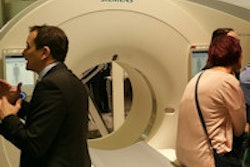The parent company of Lantheus Medical Imaging, Lantheus Holdings, is touting new data showing the utility of its investigational flurpiridaz F-18 PET radiopharmaceutical for assessing obese patients with coronary artery disease (CAD).
The study compared flurpiridaz for myocardial perfusion imaging (MPI) to MPI with SPECT for assessing CAD in patients with a body mass index (BMI) of at least 30. The new data from a subanalysis of the first phase III study were presented on April 4 at the American College of Cardiology (ACC) annual meeting in Chicago.
Based on a blinded read of PET and SPECT data, flurpiridaz F-18 PET imaging demonstrated statistically significant greater sensitivity (71.1%) versus SPECT (51.7%) (p < 0.001) and similar specificity (79.8%) versus SPECT (77.5%) (p = 0.002), the researchers found. The diagnostic superiority of flurpiridaz PET was demonstrated by receiver operator characteristics (ROC) analysis (p < 0.001).
A significantly higher percentage of images were rated as excellent or good quality with flurpiridaz, compared with SPECT, for stress images and rest images. Diagnostic certainty of interpretation was significantly higher for flurpiridaz as well. No drug-related serious adverse events were observed, and radiation exposure associated with flurpiridaz PET was reduced to less than 50% of that associated with standard SPECT.
The data are from a multicenter, international phase III study of flurpiridaz with approximately 800 patients with known or suspected CAD who were scheduled for coronary angiography and conventional SPECT.




















